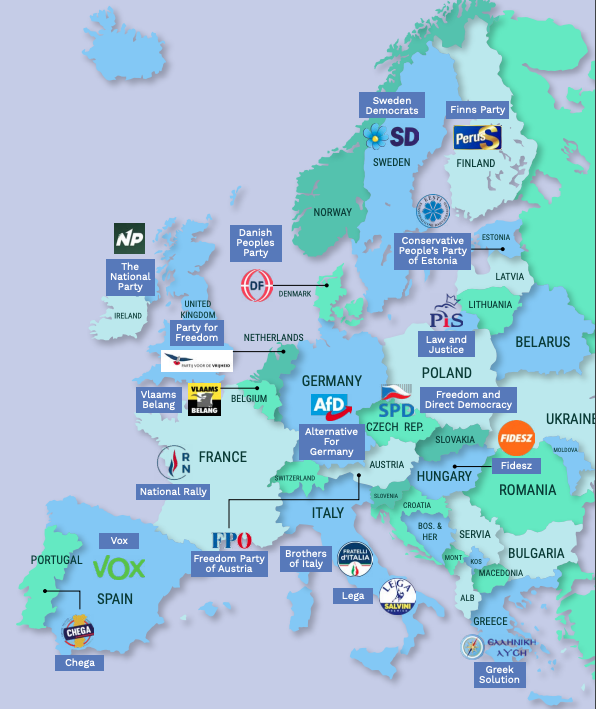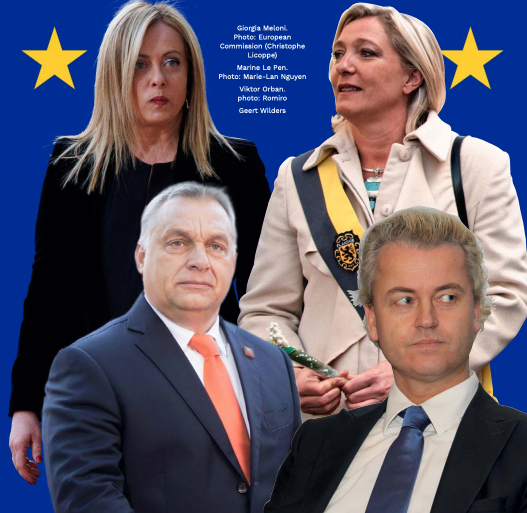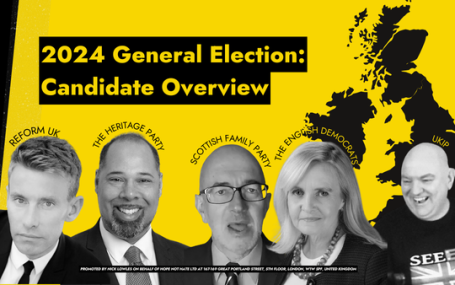HOPE not hate uses cookies to collect information and give you a more personalised experience on our site. You can find more information in our privacy policy. To agree to this, please click accept.
To better understand the forthcoming European Elections and what they could mean for the future of Europe, Joe Mulhall sat down with the leading academic of the far right, Cas Mudde.
With the European Parliament (EP) elections fast approaching the polls suggest that much of Europe’s far-right will perform worryingly well. With 720 seats up for grabs across 27 member states, radical and far-right parties are currently leading the polls in as many as nine countries, including Austria, Belgium, Italy, Poland, the Netherlands, and France. Worrying results are also predicted in Sweden, Germany, Spain and Portugal.
However, the number of seats elected by each country varies depending on their size, meaning that even if the far-right don’t come first in larger countries they will still send a significant number of MEPs to Brussels. This means that a strong showing from the Alternative for Germany (AfD) could have a real impact on the makeup of the EP as Germany has 96 seats in the European Parliament.
But Cas Mudde cautions against the idea that there will be any major shocks when it comes to the far-right vote, not least because it has performed well in the last two EP elections. Also, the results are likely to reflect the increasingly strong far-right results in many national elections. “People are often shocked by the far-right results in the European elections for the simple reason that we compare it with five years ago,” he says. “But if you actually compare it to national elections in the last two years, then the European far right doesn’t actually score that much higher in the EP than it does in those national elections. So for me, I don’t expect a shock anywhere. I think the far right comes out probably with about a quarter of the vote. And then the whole question is really what do they do with that?”
That’s the important question. A strong showing by the far-right doesn’t necessarily mean more impact in the EP. “European politics is all about group formation, because in the end, what we have seen is that the far right did electorally well in 2014 and did well again in 2019 but was politically completely irrelevant,” says Mudde. “And that could happen again.” The real danger will come if strong results are combined with effective collaboration after the elections.
Far Right Groups in Parliament
While the EP elections are actually a collection of 27 national elections, the winning parties sit together in groups, defined by their ideology. The two furthest right of which are the European Conservative and Reformists (ECR) and the even further-right Identity and Democracy (ID).

While almost everyone accepts that ID is a far-right grouping, many in the media continue to call the ECR “conservative”. When asked if this was a fair description, Mudde was clear: “I think it’s ridiculous. There are still a couple of conservative parties in it. But almost all of the others are either bonafide far-right parties that were always far right, like the Sweden Democrats or Vox, or Brothers of Italy, or they are radicalised conservative parties, which are undoubtedly now far-right like Law and Justice. It is a far-right group. It’s a far-right group with the occasional conservative party.” Mudde says he is “99% certain” that Viktor Orban’s Fidesz party will join the ECR after the elections which will prove his point further.
Polls currently predicting that ID – which includes the Alternative for Germany (AfD) and France’s National Rally – could see the biggest growth, jumping from 59 to as many as 85 seats and the ECR on track to win as many as 75 seats. “If you actually look at the ECR and ID together, given that almost the whole of the ECR is far-right, then the far right could be the biggest ideology. It gets the most votes. More than the Christian Democrats, more than the social democrats and greens,” explains Mudde.
Whether in national elections or European ones, one of the dangers that results from a strong far-right vote is that mainstream parties feel increasingly able and willing to collaborate with them. The crumbling of the so-called cordon sanitaire contributes to the increasing normalisation of far-right politics and parties. “One of the reasons why many don’t want to call the ECR far right,” explains Mudde, “is because there isn’t currently a cordon sanitaire around them. The ECR is not one of the ‘normal groups’, but it is one of the groups with which they [mainstream parties] make deals.”
The most likely group to deal with the ECR is the centre-right European People’s Party Group (EPP). “I think the big winner of the European elections is going to be the right wing of the EPP in which the power has shifted towards its more right wing parties. And at the national level some of these parties have been collaborating with the far right for decades.” To push through their agenda, they will use the threat of collaboration with the far-right to gain concessions for their harder policy objectives. “It’s not that the ECR or ID will get exactly what they want,” says Mudde. “But we will get more right-wing politics.”
Normalisation
Perhaps the clearest sign that far-right politics is becoming more normalised across Europe is how strong results are increasingly greeted with a shrug, rather than the outrage and protest that was the norm a decade or two ago. More and more, far-right parties are sanitised and discussed in a way that makes it easier for mainstream politicians to justify collaboration.
“What is most amazing is that last summer in Europe, the two parties that I got the most pushback for calling far right were the Sweden Democrats and Giorgia Meloni’s Brothers of Italy, two parties that have very clear foundations in the extreme right,” explains Mudde. “Not long ago no-one wrote a story about the Sweden Democrats without mentioning its Neo-Nazi roots. But now you get pushback, including from Swedish academics, for using the term ‘far right’. Many now call them ‘conservative’. So it goes very fast.”

The best example of this speedy normalisation is Meloni in Italy. “She’s never really seen as radical but Meloni is a product of a fascist subculture. Whether or not she is a fascist herself is irrelevant. Most of her socialising comes out of the far right. And there’s no indication, as far as I can see, that she has given that up, rather, she is pacing herself.”
One way in which these parties have sought respectability is through support for Ukraine in the ongoing war which Mudde argues, “has become a kind of bellwether. It’s now seen as the defining feature of whether or not you are a democratic party and Meloni has understood that. Once you’re pro-Ukraine, you can go after the LGBTQI community at home without facing as much international criticism.”
The Effect
There is no doubt that far-right electoral wins are a problem in and of themselves but what effect will they have on the legislative program of the European Parliament? “It’s pretty straightforward,” explains Mudde, highlighting three main areas. “The European Green Deal is already being dismantled as we speak, especially since the recent farmers demonstrations. This will continue.”
The second area, unsurprisingly, is immigration. However, once again, Mudde highlights the role played by the centre-right EPP rather than just the far-right groups. “The EPP is strongly campaigning on immigration and bragging that it has formed these deals with dictators in neighbouring countries, arguing that they get things done, while the far right is just shouting. Of course, these deals don’t help, the asylum seekers will come through some other country. And so I expect more of this type of right wing politics to grow.”
The final area will likely be anything related to so-called “culture war” issues, namely LGBTQI+ and women rights. “On this the European Parliament and the European Commission has advanced some positive progressive policies, but they are going to be shut down by the ECR and ID.” This could cause all sorts of problems when it comes to passing any policies that take into account gender or sexuality. “I mean, as soon as you put a gender element into your economic policy, the far right will vote against it.”
An existential threat?
With such bad results expected, it’s not surprising that some are asking if the European Union is facing an existential threat from the far-right, much of which is highly Eurosceptic. Yet Mudde remains more optimistic. “You have to remember that 75% will not vote for the far right. That’s an immense number, 75% is not just the majority, it’s a qualifying majority or a constitutional majority in virtually every country.”
However, he is far from complacent. “The existential threat is only possible because liberal democratic parties don’t defend liberal democracy. And if liberal democrats don’t think about what the boundaries are of liberal democracy, then what you see is that these boundaries are being pushed by the far right.”
Mudde finishes with a reminder of where the real blame lies. “If you see authoritarian politics rising, the first one to blame isn’t the far right. The first one to blame is always the mainstream parties who have voted for it. Because in the end, without the mainstream, there is no majority for far-right politics.”
Cas Mudde is the Stanley Wade Shelton UGAF professor of international affairs and a Distinguished Research Professor at the University of Georgia, and author of The Far Right Today.

When voters go to the polls on July 4th, they will choose between a record number of candidates. This year, 4,515 people are contesting parliamentary…